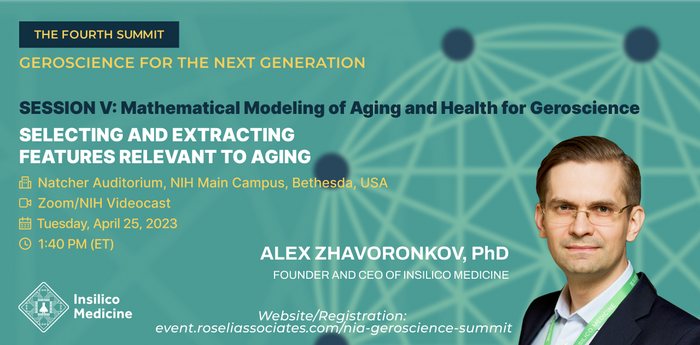Insilico Medicine founder and CEO Alex Zhavoronkov, PhD, a pioneer in generative AI for drug discovery and in uncovering dual pathways for aging and disease, will present at The Fourth Summit: Geroscience for the Next Generation organized by the Geroscience Interest Group of the National Institutes of Health (NIH) and the U.S. Department of Health and Human Services, happening April 24-26 at the NIH Main Campus in Bethesda, Maryland. Zhavoronkov will speak April 25, 1:40pm ET as part of the session on Mathematical Modeling of Aging and Health for Geroscience on “Selecting and Extracting Features Relevant to Aging.”

Credit: Insilico Medicine
Insilico Medicine founder and CEO Alex Zhavoronkov, PhD, a pioneer in generative AI for drug discovery and in uncovering dual pathways for aging and disease, will present at The Fourth Summit: Geroscience for the Next Generation organized by the Geroscience Interest Group of the National Institutes of Health (NIH) and the U.S. Department of Health and Human Services, happening April 24-26 at the NIH Main Campus in Bethesda, Maryland. Zhavoronkov will speak April 25, 1:40pm ET as part of the session on Mathematical Modeling of Aging and Health for Geroscience on “Selecting and Extracting Features Relevant to Aging.”
Insilico has focused on the intersection of aging and disease since its inception, and Zhavoronkov is a leading expert in the longevity space, and one of the founders of the Aging Research and Drug Discovery conference. When deep neural networks (DNNs) – the drivers of artificial intelligence (AI) – began outperforming humans in the mid-2000s, the Company began training DNNs on human “multi-omics” data and then retraining them on disease.
“DNNs gave us the ability to generate massive synthetic data with age as a generation condition,” says Zhavoronkov. “And we could use these DNNs to better understand human disease and aging biology.”
The Company went on to build an end-to-end AI-driven drug discovery platform called Pharma.AI that includes target discovery (PandaOmics), drug design (Chemistry42), and clinical trial prediction (InClinico). In 2022, Insilico used this platform to identify 145 aging-related therapeutic targets across diseases including Alzheimer’s, Parkinson’s, and osteoarthritis, which were further narrowed into 9 promising dual aging and disease targets. The results were published in the journal Aging. Insilico’s lead therapeutic candidate, for the devastating aging-related lung disease idiopathic pulmonary fibrosis, has received positive topline results in Phase 1 clinical trials and Orphan Drug Designation from the FDA.
Geroscience, the study of interventions to delay or stop the functional decline associated with aging-related diseases, is a rapidly growing field. One of the field’s major challenges is how to measure overall health and rates of aging – to accurately assess the conditions or interventions that slow or accelerate aging, especially in the context of clinical outcomes. Utilizing mathematical modeling and AI can provide key insights.
“The acceleration of AI technology has had significant impact on aging and longevity research,” says Zhavoronkov. “First, we were able to identify biomarkers for aging. Now, we are using those insights to transform the entire drug discovery process.”
About Insilico Medicine:
Insilico Medicine, a clinical-stage end-to-end generative artificial intelligence (AI)-driven drug discovery company, is connecting biology, chemistry, and clinical trials analysis using next-generation AI systems. The company has developed AI platforms that utilize deep generative models, reinforcement learning, transformers, and other modern machine learning techniques to discover novel targets and design novel molecular structures with desired properties. Insilico Medicine is delivering breakthrough solutions to discover and develop innovative drugs for cancer, fibrosis, immunity, central nervous system (CNS) diseases, and aging-related diseases. www.insilico.com



